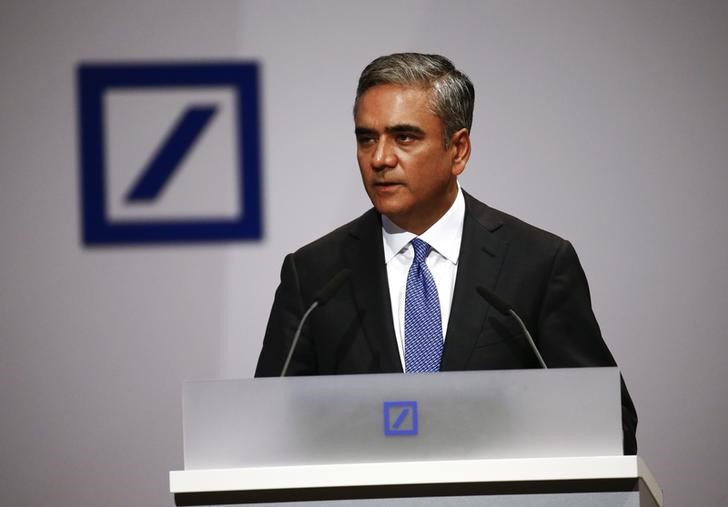FRANKFURT (Reuters) - Deutsche Bank (DE:DBKGn) co-Chief Executive Anshu Jain won welcome support from the group's top labor representative on Friday, who said a Frankfurt-based workers council acted alone when it called for Jain's resignation this week.
One works council representing employees in key administrative functions in the bank's Frankfurt headquarters on Thursday demanded Jain resign as Germany's largest lender prepares to slash jobs.
But Alfred Herling, the No. 2 ranking supervisory board member after Chairman Paul Achleitner, said the corporate centre works council was one of around 40 autonomous works councils and did not speak for the group.
"This didn't happen with the agreement of the general- or group-wide workers council, and it doesn't have to. As such, neither does it reflect the view of all the works councils in our bank," Herling, who is paid by Deutsche Bank, told Reuters.
German works councils can be loud opponents to management strategy, such as job cuts, but they yield little real power on the supervisory board, the highest oversight body that directly oversees management and chooses chief executives.
Thursday's incident, however isolated, reveals battle lines forming between management and staff, mainly in the bank's extensive retail branch network, as Jain leads a strategy that promises to slash 4.7 billion euros in costs by 2020, largely through job cuts.
The bank plans to close some 200 out of 700 of its own-branded retail branches and sell off its independently branded Postbank (DE:DPBGn) chain.
Jain was made directly responsible for reforms and cost cuts in a boardroom shake-up last week that saw co-CEO Juergen Fitschen lose some of his responsibilities.
Shareholders chastised management last week for lagging profits, soaring fines and sluggish reforms and called on management to whip the bank into shape and revive a lagging share price.
"I'm certain that Juergen Fitschen and Anshu Jain will do everything to take the bank forward again," Herling told Reuters. Herling earned 272,849 euros ($299,000)in fixed compensation from Deutsche Bank last year. He also converted 2,657 notional shares in February as part of his 2014 compensation.
TOUGH REFORMS
Herling's vote of confidence was echoed by one of the bank's top 25 institutional shareholders, who said removing Jain would hardly be an answer to the bank's reform needs. Deutsche needed to show clear improvements in the next 12-18 months, he said.
"Jain has a very tough job and there's no magic solution," the investor said under the condition of anonymity.
"You can criticize him on some levels but the fact that there's a hint of rebellion when he starts to do something just underlines how difficult it is to do anything."
One legal advisor to the bank, who declined to be named because he is not authorized to speak to the press, said Jain faced a "four-dimensional battlefield", with staff, clients and shareholders pulling in different directions, and with outside interests such as politicians and consumers pulling in another.
"It's such a complex organization with so many interest groups who all want to get something out of the bank," he said. "From the outside, it looks like chaos."
Deutsche Bank has 98,615 staff globally, of which 45,803 work in Germany.
The Frankfurt works council representing some 2,500 employees distributed a flyer saying staff morale was suffering.
The labor representatives who distributed the flyer are not members of the bank's supervisory board, or board directors where labor representatives hold half the seats.
Deutsche Bank shares were down 1.32 percent at 1221 GMT as the Stoxx Europe 600 Banks index (SX7P) was 0.55 percent lower.

For a graphic on Deutsche Bank's share price performance since co-CEOs Jain and Fitschen took office: http://link.reuters.com/dyf63w